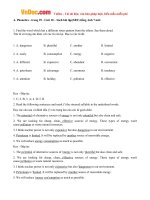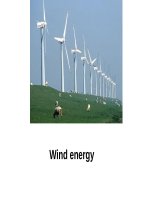Unit 10 Sources of Energy Lesson 5 Skills 1
Bạn đang xem bản rút gọn của tài liệu. Xem và tải ngay bản đầy đủ của tài liệu tại đây (2.08 MB, 22 trang )
Le Do Secondary School
WELCOME TO OUR CLASS TODAY
Subject: English 7
Teacher: Mr Tran Minh Hieu
Discuss
1. What are the main sources of
energy in Vietnam?
2. What type of energy sources will
be used in the future?
Unit 10. Sources of energy
lesson 5. Skills 1
I. Vocabulary
•
•
•
•
•
•
•
Create= generate
Replace
Turn turbines
Convert into
Great deal of= a lot of
Alternative
Fossil fuels
:tạo ra,sản xuất ra
: thay thế
: làm quay tua bin
:chuyển hóa thành
: nhiều, rất nhiều
:thay thế
: nhiên liệu hố thạch
Read the text
carefully
in 2 mins.
2. Read the text and check: (Ex. 2 / p. 44)
1. What are the main sources of energy in
Viet Nam?
2, What types of energy sources will be
used in the future?
Dear guests, I’d like to talk to you today about renewable
and non-renewable energy.
Fossil fuels are non-renewable energy sources. They
include oil, coal, and natural gas. They can be used to create
energy, generate electricity, or drive big machinery.
Unfortunately, they are harmful to the environment. Viet
Nam still relies mostly on non-renewable energy sources,
however, hydro power is increasingly used here too.
Hydro and nuclear power can generate a great deal of
energy. They are renewable and plentiful. However, hydro
power is limited because dams cannot be built in certain
areas. Nuclear power can provide enough electricity for the
world’s needs, but it is dangerous.
The sun and the wind are other alternative sources of
energy. The wind turns turbines to make electricity. Solar
power can be converted into electricity. It can be used to
heat or cool our houses. Although there are some
disadvantages, these alternative energy sources can offer
abundant amounts of clean, safe electricity. They will be
1. create
2. drive
3. generate
5. heat
4. turn
a. machinery
b. turbines
c. energy
d. houses
e. electricity
Answer the questions.
Lucky energy???
How many types of energy sources are
mentioned in the text?
What are they?
Two, they are renewable
and non-renewable.
What are the disadvantages of hydro and
nuclear power?
Hydro power is limited because dams
can not be built in certain areas. Nuclear
power is dangerous.
Why do you think the wind and the sun
are called alternative sources of energy?
Because they are natural sources of
power and we use them instead of
non-renewable sources.
Congratulation !!!
What types of energy does Vienam use
most?
We use non-renewable sources of energy
the most but we are increasingly using
hydro power.
What does the professor think Vietnam
will use more in the future?
He thinks Vietnam will use the wind and
the sun in the furture.
Let’s talk!!!
What type is
it?
What is its
advantage?
What is its
disadvantages?
Sources of energy
Ask and answer about adantages and
disadvantages of energy sources.
A: What type of energy is oil?
B: It is non-renewable source of energy, because it can
not easily be replaced.
A: What are its advantages and disadvantages?
B: It can be used to power machinery, but it also pollutes
the environment.
Sources of
energy
Types of energy
Advangtage(s)
Disadvantage(s)
oil/ coal/
natural gas
non-renewable
create energy
generate electricity
drive machinery
harmful to the
environment
hydro
hydro
renewable
renewable
nuclear
renewable
generate
dealof
of
generateaagreat
great deal
energy
energy
can
can not
not build
build dams
dams
dangerous
solar
renewable
converted into electricity,
heat or coal the houses
not available
wind
renewable
make electricity
not available
A: What type of energy is oil?
B: It is non-renewable source of energy, because it can not easily be replaced.
Comes from water
A: What are its advantages and disadvantages?
B: It can be used to power machinery, but it also pollutes the environment.
Hydro power is a renewable source of
energy because it comes from water. It is
cheap and plentiful. Unfortunately, dams
can only be built in certain areas.









